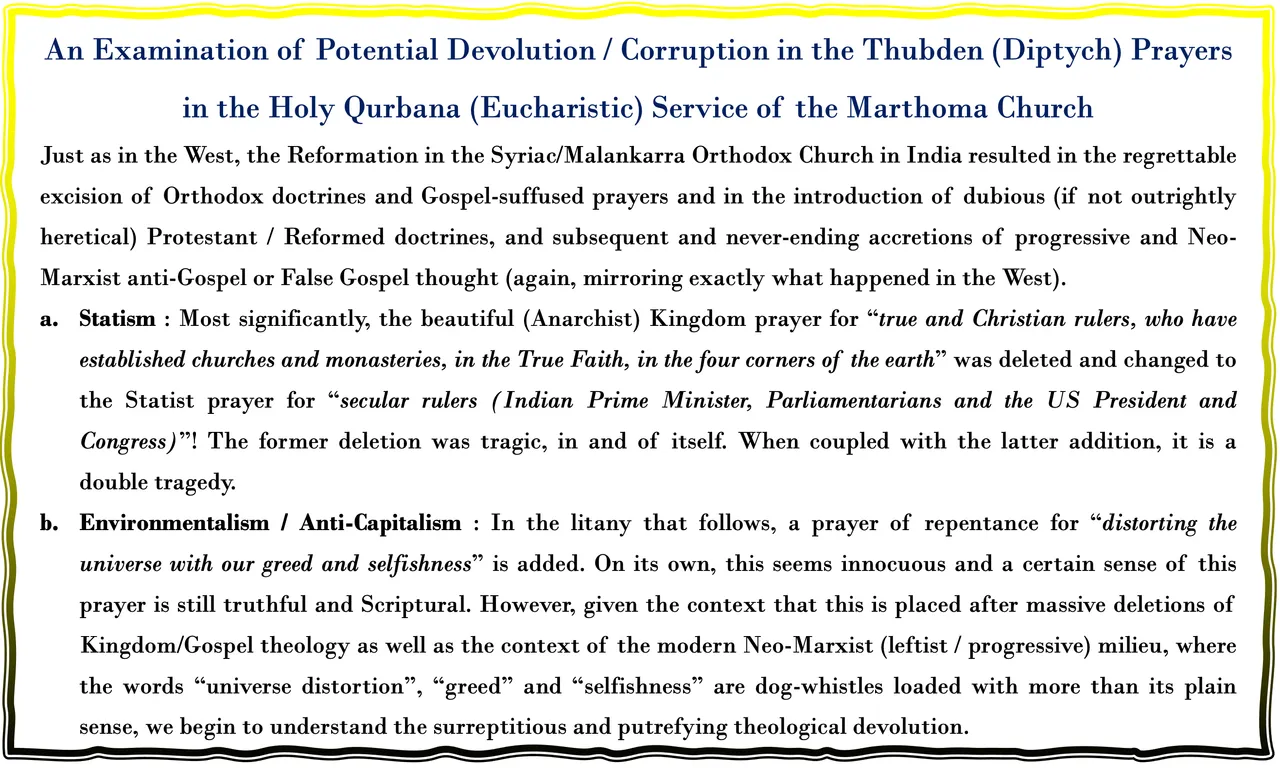
The Mar Thoma Syrian Church (my own original familial/ecclesial background) historically arose in the context of the theological and evangelistic influence of Western (Anglican) Reformed thought in the seminaries of the Syriac Malankarra Orthodox Church in India. In one telling of the story (which I had previously believed fully), this Reformation in the Indian Church effected a return to the Orthodox Apostolic faith (through an excision of extra-Biblical or non-Biblical practices that had accreted within the extant Church). A different telling of the story (which is my recent increasing conviction) is that the Western (Reformed) influence brought in non-Orthodox beliefs and practices. In the following, I outline some important differences (deletions, modifications and additions) that stood out for me between the Marthoma (Reformed) version of the St. James liturgy and the Orthodox (Malankarra or Jacobite) version (these differences are evident in both the Malayalam and English versions).
- Statism : The most significant change I noticed is the complete deletion of the prayer for “true and Christian rulers”, whose true/Christian/natural authority is evidenced by their deployment of their wealth and power for the “building and establishing of churches and monasteries in the true faith, in the four corners of the earth”.
[a] This deletion is already tragic, in and of itself, since it removes from the mind of the worshipper, the notion of natural and just order and dominion (which is a feature of the Kingdom of Christ), where authority is evidenced by work/time/money/energy expended to build physical places of worship for the propagation of the true faith, which also already entails other concomitant forms of Corban (offerrings) of succor and benevolence for the less fortunate (widows and orphans).
[b] Furthermore, the text was changed to a prayer for secular rulers – in the case of India, it includes a special prayer for the Prime Minister and Members of Parliament. In the US, this is extended to the members of the US Federal Government. These secular rulers are, in actual fact, immoral and illegitimate, and are “rulers” only in the same sense that a mafia “rules” (violently dominates) a given area and people it terrorizes and subjugates. Now, certainly, a Christian may pray for these violent oppressors that they repent, that they nevertheless dispense justice in some matters in spite of their unjust power, that the Church may nevertheless live and proclaim the rival Kingdom of Christ peacefully. We are commanded to love our enemies, therefore, praying for them is a natural outworking of that love too. However, these secular rulers are our enemies, being the enemies of Christ’s Kingdom and Kingship. They do not occupy any special legitimate dispensation in the economy of God’s Kingdom – this is a Western (Reformed Protestant) heresy, sometimes called the Two Kingdoms doctrine. To be remembered in a special sense in the Diptychs reinforces this heresy. Taken together with the deletion mentioned above, this is sadly regrettable! - Environmentalism / Anti-Capitalism : In the litany that follows, a prayer of repentance for “distorting the universe with our greed and selfishness” is added. On its own, this seems innocuous and a certain sense of this prayer is still truthful and Scriptural. However, given the context that this is placed after massive deletions of Kingdom/Gospel theology as well as the context of the modern Neo-Marxist (leftist / progressive) milieu, where the words “universe distortion”, “greed” and “selfishness” are dog-whistles loaded with more than its plain sense, we begin to understand the surreptitious and putrefying theological devolution.
- In addition, many remembrances of Apostles, pillar Saints and Patriarchs were sadly removed (and this was not even theologically warranted by the already dubious theological innovation of not requesting the intercession of the saints) -- this had the effect of unmooring the worshipping community from its corporal and concrete history in time and space. It would not be surprising if the first two points are deeply related to the implied theological posture of this last point.